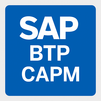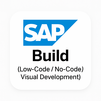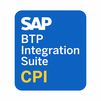-interview-question-answers.jpg)
SAP Integrated Business Planning (IBP) training provides a comprehensive understanding of the IBP suite, covering demand planning, supply chain analytics, and inventory optimization. Participants will learn to leverage SAP IBP for real-time, integrated business planning, enabling efficient decision-making. The course includes hands-on exercises, case studies, and best practices to ensure practical knowledge and skills applicable in real-world scenarios, enhancing overall supply chain management capabilities.
SAP Integrated Business Planning (IBP) Interview Questions - For Intermediate
1. What is SAP IBP?
SAP Integrated Business Planning (IBP) is a cloud-based software that helps businesses plan and manage their supply chains more effectively by integrating real-time data and analytics.
2. Can you describe the components of SAP IBP?
The main components of SAP IBP include Supply Chain Control Tower, Demand Planning, Inventory Optimization, Response and Supply Planning, and Sales and Operations Planning (S&OP).
3. What is the role of the SAP IBP Control Tower?
The Control Tower provides an overview of the entire supply chain, enabling real-time monitoring and alerting, which helps in making informed decisions quickly.
4. How does Demand Planning in SAP IBP work?
Demand Planning in SAP IBP uses historical data, statistical models, and machine learning algorithms to forecast future demand accurately.
5. What is the importance of Inventory Optimization in SAP IBP?
Inventory Optimization helps businesses maintain optimal inventory levels, reducing costs and ensuring that products are available when needed.
6. Can you explain the process of Sales and Operations Planning in SAP IBP?
S&OP in SAP IBP involves aligning production and distribution plans with business goals, balancing supply and demand, and integrating financial and operational planning.
7. How does SAP IBP integrate with SAP ERP?
SAP IBP integrates with SAP ERP through the SAP Cloud Platform Integration (CPI) which allows for real-time data transfer and synchronization between systems.
8. What is the difference between SAP APO and SAP IBP?
SAP APO is an older, on-premise solution that focuses on supply chain planning, whereas SAP IBP is a more modern, cloud-based solution that offers broader functionalities including real-time data processing and integration capabilities.
9. What is a planning area in SAP IBP?
A planning area in SAP IBP is where actual planning data is stored. It defines which data is to be planned and how planning functions are executed.
10. How is user-based security managed in SAP IBP?
User-based security in SAP IBP is managed through roles and authorizations that control access to data and functions based on the user’s role within the organization.
11. What is time series-based planning in SAP IBP?
Time series-based planning involves forecasting and planning based on historical data points collected over intervals of time, used for trend analysis and future prediction.
12. How do you handle data integration in SAP IBP?
Data integration in SAP IBP is handled through data import jobs from various sources, including direct uploads, SAP ERP systems, and other third-party systems.
13. Can you explain the role of heuristics in SAP IBP?
Heuristics in SAP IBP are used for supply planning, providing a simpler and faster method to generate supply plans based on rules and algorithms.
14. What is SAP IBP's optimization feature?
The optimization feature in SAP IBP uses advanced algorithms to find the best possible plan that meets all constraints and maximizes business objectives.
15. How does SAP IBP support what-if analysis?
SAP IBP supports what-if analysis by allowing planners to simulate different scenarios and assess potential impacts on the supply chain before making decisions.
16. What types of alerts does the SAP IBP Control Tower generate?
The Control Tower generates proactive and reactive alerts for issues like stock outs, delayed shipments, and demand spikes to facilitate timely action.
17. How does SAP IBP handle data visualization?
SAP IBP uses dashboards and reports to visualize data, providing clear insights into trends, performance metrics, and potential issues in the supply chain.
18. Can you perform attribute-based planning in SAP IBP?
Attribute-based planning in SAP IBP allows planning at different levels of granularity by using product or location attributes to refine the planning process.
19. What is the importance of responsiveness in SAP IBP?
Responsiveness in SAP IBP is crucial for adapting to changes in the supply chain quickly, helping businesses maintain service levels and reduce disruptions.
20. How do you update master data in SAP IBP?
Master data in SAP IBP is updated through scheduled imports from connected systems or manual updates, ensuring that the planning process uses the most current and accurate data.
SAP Integrated Business Planning (IBP) Interview Questions - For Advanced
1. Explain the key components of SAP IBP and how they integrate to provide end-to-end supply chain visibility.
SAP IBP consists of several key components, including Demand Planning, Inventory Optimization, Sales and Operations Planning (S&OP), Supply Planning, and Response and Supply Orchestration. Each component addresses specific areas of the supply chain but integrates seamlessly to provide a holistic view. Demand Planning forecasts future demand based on historical data and market analysis. Inventory Optimization balances inventory levels across the supply chain to minimize costs while meeting service levels. S&OP aligns operational plans with business objectives, ensuring all departments work towards the same goals. Supply Planning determines the most efficient way to fulfill demand, considering constraints like production capacity and lead times. Response and Supply Orchestration allows for real-time adjustments to plans based on changing conditions. This integration ensures that all aspects of the supply chain are considered in decision-making, leading to improved visibility and coordination.
2. How does SAP IBP handle demand sensing, and what benefits does it bring to the supply chain?
Demand sensing in SAP IBP uses advanced algorithms and real-time data to create short-term, accurate demand forecasts. Unlike traditional forecasting methods that rely heavily on historical data, demand sensing incorporates real-time information from various sources, including point-of-sale data, social media trends, and market signals. This approach allows for quicker adjustments to changes in demand patterns, reducing forecast latency. The benefits of demand sensing include improved forecast accuracy, reduced inventory levels, and enhanced responsiveness to market changes. This leads to better customer service, lower operational costs, and a more agile supply chain.
3. Discuss the role of machine learning in SAP IBP and provide examples of how it can be utilized.
Machine learning in SAP IBP enhances predictive analytics and decision-making processes. By analyzing large volumes of data, machine learning algorithms identify patterns and trends that may not be evident through traditional analysis. Examples of machine learning applications in SAP IBP include demand forecasting, where algorithms predict future demand based on a variety of factors, and inventory optimization, where machine learning models determine the optimal inventory levels by considering variables like lead times, demand variability, and supply constraints. Additionally, machine learning can be used in scenario planning to evaluate the potential impact of different strategies and make informed decisions. This leads to more accurate forecasts, better inventory management, and overall improved supply chain efficiency.
4. How does SAP IBP support Sales and Operations Planning (S&OP), and what are the key benefits of using it?
SAP IBP supports Sales and Operations Planning (S&OP) by providing a collaborative platform where different departments can align their plans and strategies. It offers integrated planning capabilities that combine financial, sales, and operational data, ensuring consistency and coherence in decision-making. Key benefits of using SAP IBP for S&OP include improved alignment between supply and demand, enhanced visibility into the entire supply chain, and the ability to create more realistic and achievable plans. This leads to better resource utilization, increased responsiveness to market changes, and improved overall performance. The collaborative features also foster better communication and coordination across departments, reducing silos and promoting a unified approach to achieving business goals.
5. Explain the concept of inventory optimization in SAP IBP and how it can impact supply chain performance.
Inventory optimization in SAP IBP involves determining the optimal inventory levels to meet demand while minimizing costs. This process considers factors such as demand variability, lead times, service level targets, and supply chain constraints. By using advanced algorithms and predictive analytics, SAP IBP helps identify the most cost-effective inventory policies, such as reorder points, safety stock levels, and lot sizes. The impact of inventory optimization on supply chain performance includes reduced carrying costs, improved service levels, and increased efficiency in inventory management. This leads to a more balanced supply chain, where inventory levels are maintained at optimal levels, ensuring product availability while minimizing excess stock and associated costs.
6. Describe how SAP IBP integrates with other SAP modules and external systems to enhance supply chain management.
SAP IBP integrates seamlessly with other SAP modules such as SAP ERP, SAP S/4HANA, and SAP Ariba, as well as external systems through standard interfaces and APIs. This integration allows for the smooth flow of data across different systems, providing a unified view of the supply chain. For example, integration with SAP ERP ensures that transactional data such as sales orders, purchase orders, and inventory levels are consistently updated in SAP IBP, enabling accurate planning and forecasting. Integration with SAP Ariba enhances procurement processes by providing real-time supplier collaboration and visibility into supplier performance. The ability to connect with external systems also allows for the incorporation of external data sources, such as market trends and economic indicators, into planning processes. This comprehensive integration enhances supply chain management by ensuring data consistency, improving visibility, and enabling more informed decision-making.
7. What are the main challenges in implementing SAP IBP, and how can they be addressed?
Implementing SAP IBP can present several challenges, including data quality issues, resistance to change, and the complexity of integration with existing systems. Data quality issues can be addressed by establishing robust data governance practices and ensuring data accuracy and consistency across all systems. Resistance to change can be mitigated through effective change management strategies, including stakeholder engagement, training programs, and clear communication of the benefits of SAP IBP. The complexity of integration can be managed by involving experienced implementation partners, conducting thorough system assessments, and developing a detailed implementation plan. Additionally, adopting a phased implementation approach can help manage the complexity by focusing on critical components first and gradually expanding the scope.
8. How does SAP IBP facilitate real-time supply chain analytics, and what advantages does this provide?
SAP IBP facilitates real-time supply chain analytics by leveraging in-memory computing and advanced data processing capabilities. This allows for the real-time collection, processing, and analysis of large volumes of data from various sources. The advantages of real-time supply chain analytics include improved decision-making, enhanced responsiveness to market changes, and the ability to quickly identify and address issues. For example, real-time analytics can provide insights into demand trends, inventory levels, and supply chain performance, enabling organizations to make informed decisions and take proactive measures. This leads to more agile and resilient supply chains, better customer service, and overall improved business performance.
9. Discuss the importance of scenario planning in SAP IBP and provide examples of its application.
Scenario planning in SAP IBP allows organizations to evaluate the potential impact of different strategies and decisions under various conditions. This involves creating multiple scenarios based on different assumptions and analyzing their outcomes to identify the best course of action. Examples of scenario planning applications in SAP IBP include assessing the impact of a sudden increase in demand, evaluating the effects of supply disruptions, and analyzing the consequences of changes in pricing strategies. Scenario planning is important because it enables organizations to prepare for uncertainties, make more informed decisions, and develop contingency plans. This enhances the ability to respond effectively to changes and reduces the risk of unexpected disruptions.
10. How does SAP IBP support collaboration across different departments and stakeholders within an organization?
SAP IBP supports collaboration across different departments and stakeholders by providing a unified platform that integrates data and processes. It offers tools for collaborative planning, real-time communication, and data sharing, enabling different teams to work together seamlessly. For example, the S&OP component of SAP IBP facilitates cross-functional collaboration by bringing together sales, finance, operations, and supply chain teams to align their plans and strategies. Additionally, SAP IBP includes features like workflow management and task tracking, which enhance coordination and ensure accountability. This collaborative approach leads to better alignment of objectives, improved decision-making, and more effective execution of plans. It also fosters a culture of teamwork and transparency, which is essential for achieving organizational goals.
Course Schedule
| Jan, 2026 | Weekdays | Mon-Fri | Enquire Now |
| Weekend | Sat-Sun | Enquire Now | |
| Feb, 2026 | Weekdays | Mon-Fri | Enquire Now |
| Weekend | Sat-Sun | Enquire Now |
Related Courses
Related Articles
Related Interview
Related FAQ's
- Instructor-led Live Online Interactive Training
- Project Based Customized Learning
- Fast Track Training Program
- Self-paced learning
- In one-on-one training, you have the flexibility to choose the days, timings, and duration according to your preferences.
- We create a personalized training calendar based on your chosen schedule.
- Complete Live Online Interactive Training of the Course
- After Training Recorded Videos
- Session-wise Learning Material and notes for lifetime
- Practical & Assignments exercises
- Global Course Completion Certificate
- 24x7 after Training Support












 Join our Live Instructor-Led online classes delivered by industry experts
Join our Live Instructor-Led online classes delivered by industry experts